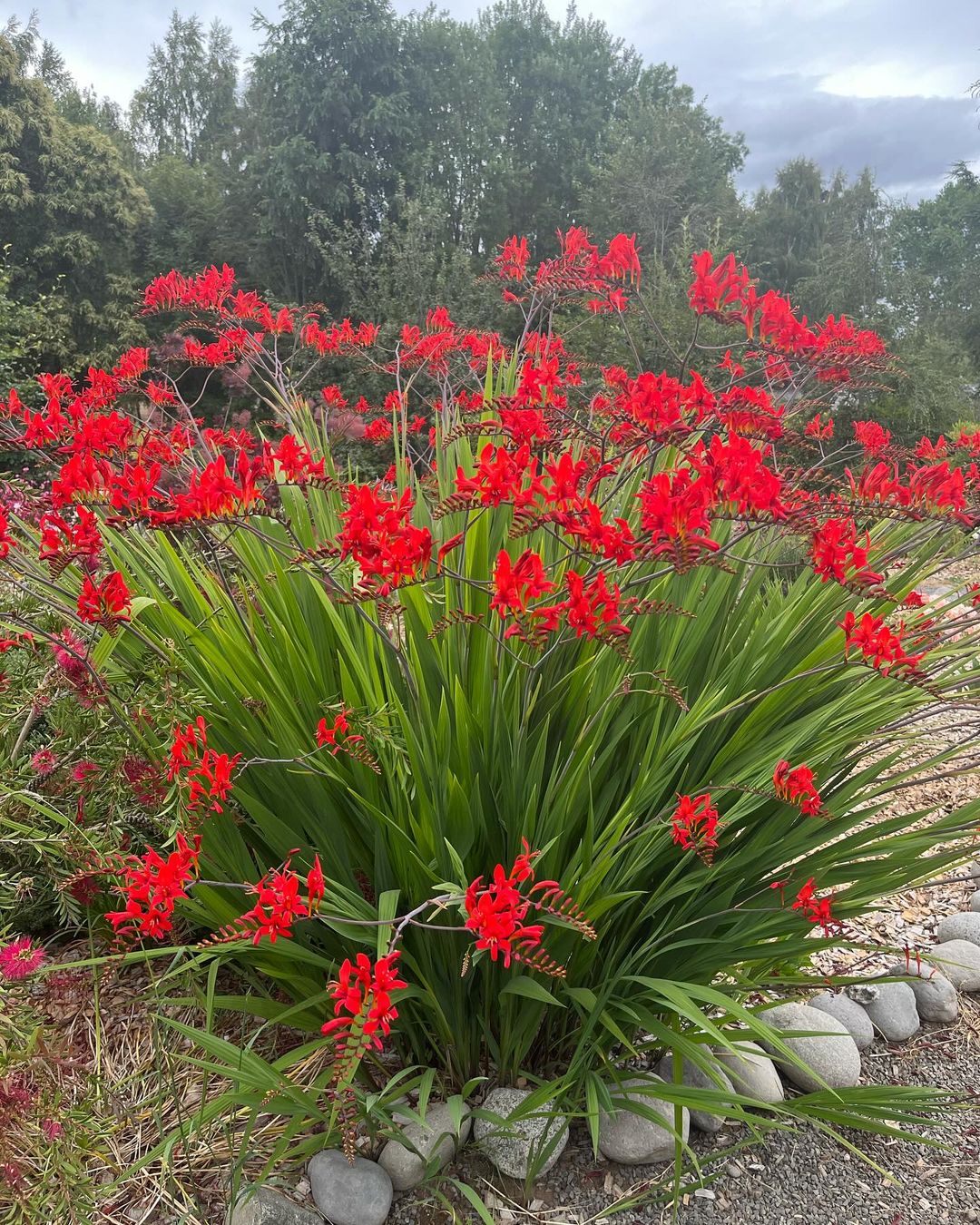Discover the vibrant Lucifer plant (Crocosmia ‘Lucifer’). Learn about its striking features, how to grow and care for this eye-catching perennial and tips for incorporating it into your garden design.
The Lucifer plant, scientifically known as Crocosmia ‘Lucifer’, is a stunning perennial that adds a burst of fiery red color to any garden. Named for its intense scarlet blooms, this plant is sure to catch the eye and become a focal point in your landscape. Let’s explore this captivating plant and how you can successfully grow it.
Here’s an easy-to-read chart for the Lucifer plant (Crocosmia):
CategoryInformationBotanical NameCrocosmia ‘Lucifer’Common NameLucifer PlantPlant TypePerennialHardiness ZoneUSDA Zones 5–9Sun ExposureFull Sun to Partial ShadeSoil TypeWell-drained, moist soilWateringModerate; drought-tolerant once establishedGrowth HabitClumping, uprightHeight/Spread3–4 ft tall / 1–2 ft wideSpecial FeaturesAttracts hummingbirds, deer-resistant, long-lasting blooms, bright red flowers
What is the Lucifer Plant?

Crocosmia ‘Lucifer’ is a cultivar of the Crocosmia genus, which belongs to the iris family (Iridaceae). Key features include:
- Vibrant red, trumpet-shaped flowers
- Sword-like green foliage
- Height: 3-4 feet (90-120 cm)
- Spread: 1-2 feet (30-60 cm)
- Blooming period: Mid to late summer
Learn more about Crocosmia varieties
Growing Lucifer Plants
Sunlight Requirements
- Full sun to partial shade
- At least 6 hours of direct sunlight daily for best flowering
Soil Conditions
- Well-draining, fertile soil
- pH range: 6.0 to 7.0
Watering Needs
- Regular watering during the growing season
- Reduce watering in winter when dormant
Temperature and Hardiness
- USDA Hardiness Zones: 5-9
- Can tolerate light frost, but needs protection in colder regions
Planting Lucifer Crocosmia
When to Plant
- Spring, after the last frost
- Or in fall, at least 6 weeks before the first frost
How to Plant
- Dig holes 3-4 inches deep
- Space corms 6-8 inches apart
- Plant with the pointed end facing up
- Cover with soil and water thoroughly
Detailed planting guide for Crocosmia
Caring for Lucifer Plants
Fertilizing
- Apply a balanced, slow-release fertilizer in spring
- Avoid over-fertilizing, which can lead to more foliage and fewer blooms
Pruning and Maintenance
- Deadhead spent flowers to encourage more blooms
- Cut back foliage in late fall or early spring
- Divide clumps every 3-4 years to prevent overcrowding
Winter Care
- In colder regions, mulch heavily to protect corms
- Consider lifting corms in zones 5-6 and storing them indoors
Common Problems and Solutions
- Gladiolus Rust: A fungal disease causing orange pustules on leaves
Solution: Improve air circulation and avoid overhead watering
- Slugs and Snails: Can damage young shoots and leaves
Solution: Use organic slug pellets or create barriers
- Spider Mites: Tiny pests that can infest foliage
Solution: Spray plants with a strong jet of water or use insecticidal soap
More on pest and disease control for Crocosmia
Designing with Lucifer Plants
Crocosmia ‘Lucifer’ makes a stunning addition to various garden styles:
- Cottage Gardens: Pair with purple coneflowers and yellow rudbeckia
- Modern Landscapes: Plant in bold drifts for a dramatic effect
- Wildlife Gardens: Attracts hummingbirds and butterflies
- Cut Flower Gardens: Excellent for floral arrangements
Get inspiration for garden design with Crocosmia
Propagating Lucifer Plants
You can propagate Crocosmia ‘Lucifer’ by:
- Division: Separate corms in spring or fall
- Seeds: Collect and sow seeds, though they may not produce true to the parent plant
The Lucifer plant, with its brilliant red flowers and easy-care nature, is a fantastic choice for gardeners looking to add a pop of color to their landscape. By following these guidelines for planting and care, you can enjoy the fiery beauty of Crocosmia ‘Lucifer’ in your garden year after year. Whether you’re creating a bold statement piece or adding to a diverse perennial bed, this striking plant is sure to impress.
Explore more about incorporating bold colors in your garden design
For more gardening tips and plant care guides, visit usagardenhub.com

